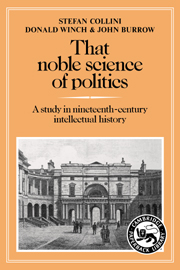Book contents
- Frontmatter
- Contents
- Preface
- PROLOGUE: The governing science: things political and the intellectual historian
- I The system of the North: Dugald Stewart and his pupils
- II Higher maxims: happiness versus wealth in Malthus and Ricardo
- III The cause of good government: Philosophic Whigs versus Philosophic Radicals
- IV The tendencies of things: John Stuart Mill and the philosophic method
- V Sense and circumstances: Bagehot and the nature of political understanding
- VI All that glitters: political science and the lessons of history
- VII The clue to the maze: the appeal of the Comparative Method
- VIII Particular polities: political economy and the historical method
- IX The ordinary experience of civilised life: Sidgwick and the method of reflective analysis
- X A separate science: polity and society in Marshall's economics
- XI A place in the syllabus: political science at Cambridge
- EPILOGUE: A nebulous province: the science of politics in the early twentieth century
- Index
VII - The clue to the maze: the appeal of the Comparative Method
Published online by Cambridge University Press: 17 September 2009
- Frontmatter
- Contents
- Preface
- PROLOGUE: The governing science: things political and the intellectual historian
- I The system of the North: Dugald Stewart and his pupils
- II Higher maxims: happiness versus wealth in Malthus and Ricardo
- III The cause of good government: Philosophic Whigs versus Philosophic Radicals
- IV The tendencies of things: John Stuart Mill and the philosophic method
- V Sense and circumstances: Bagehot and the nature of political understanding
- VI All that glitters: political science and the lessons of history
- VII The clue to the maze: the appeal of the Comparative Method
- VIII Particular polities: political economy and the historical method
- IX The ordinary experience of civilised life: Sidgwick and the method of reflective analysis
- X A separate science: polity and society in Marshall's economics
- XI A place in the syllabus: political science at Cambridge
- EPILOGUE: A nebulous province: the science of politics in the early twentieth century
- Index
Summary
On us a new light has come. I do not for a moment hesitate to say that the discovery of the Comparative Method in philology, in mythology – let me add in politics and history and the whole range of human thought – marks a stage in the progress of the human mind at least as great and memorable as the revival of Greek and Latin learning.
e. a. freeman, ‘The Unity of History’(1872)Political science … coordinates the most interesting facts of history; it gives method to investigations; it appeals at once to the statesman and to the antiquarian; it is equally interesting to the politician, to the student of the most ancient races, and to the explorers of the existing rudimentary societies. It is really a great thing to have discovered that this is the best clue to the maze of annalistic facts; the best assistance to historical study both at school and at the University. The merit of this discovery belongs jointly to Professor Seeley and to Professor Freeman.
oscar browning, ‘The Historical Tripos’, The Cambridge Review (1885)to recapture the importance for contemporaries of the intellectual episode we shall consider in this essay requires the cultivation of a mood of vicarious euphoria. In the 1860s and 70s the map of learning seemed, to many members of the educated class in England, about to be re-drawn in an exhilaratingly comprehensive and coherent way.
- Type
- Chapter
- Information
- That Noble Science of PoliticsA Study in Nineteenth-Century Intellectual History, pp. 207 - 246Publisher: Cambridge University PressPrint publication year: 1983
- 1
- Cited by



